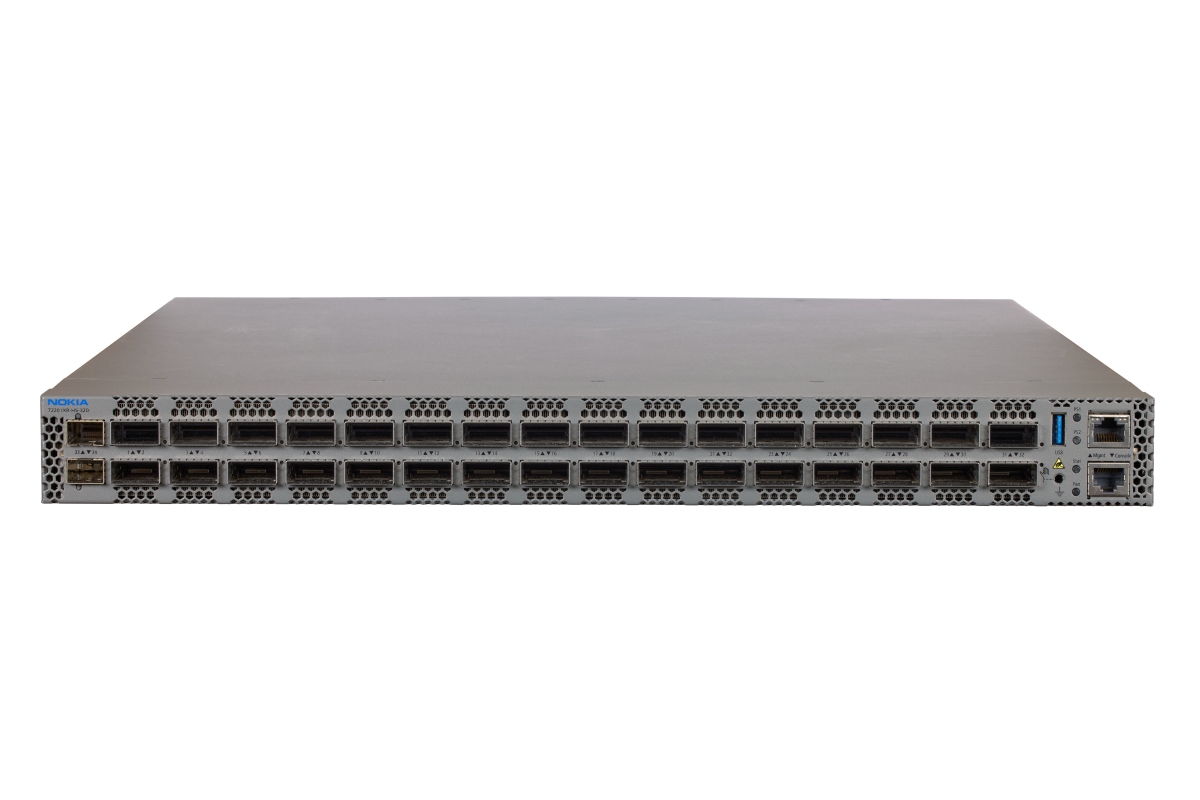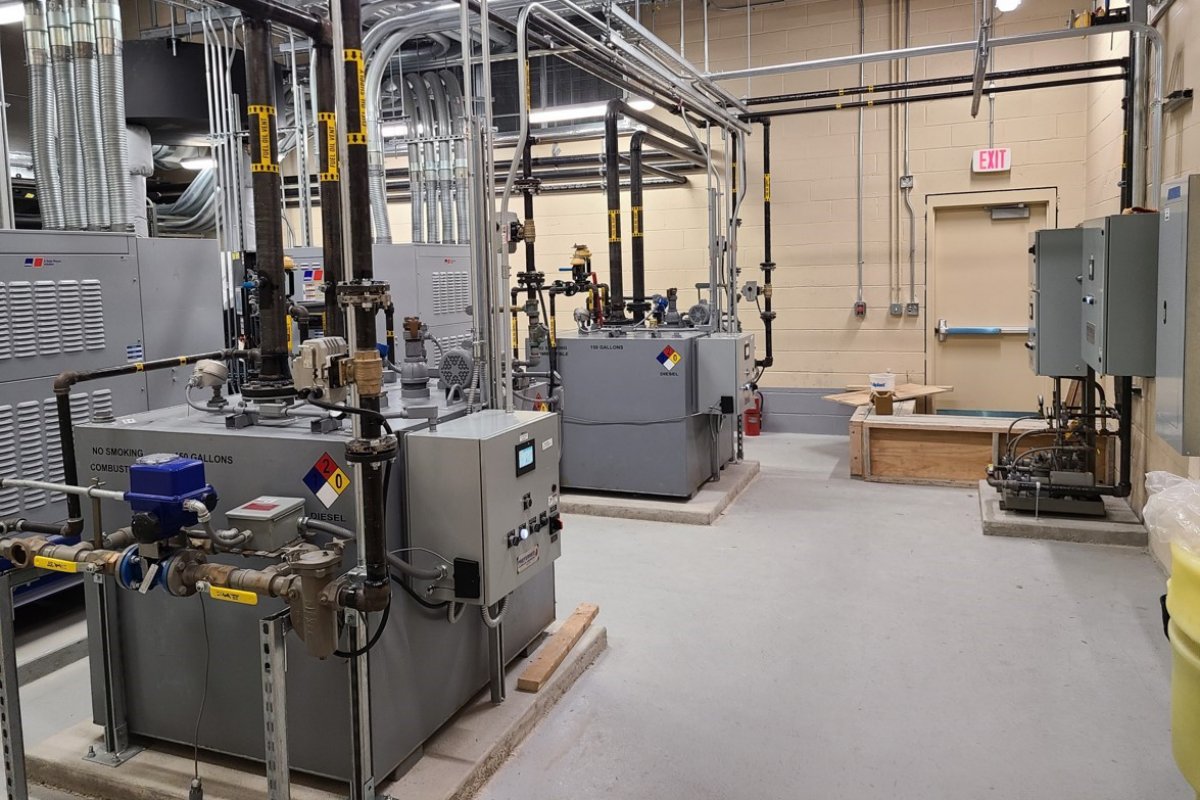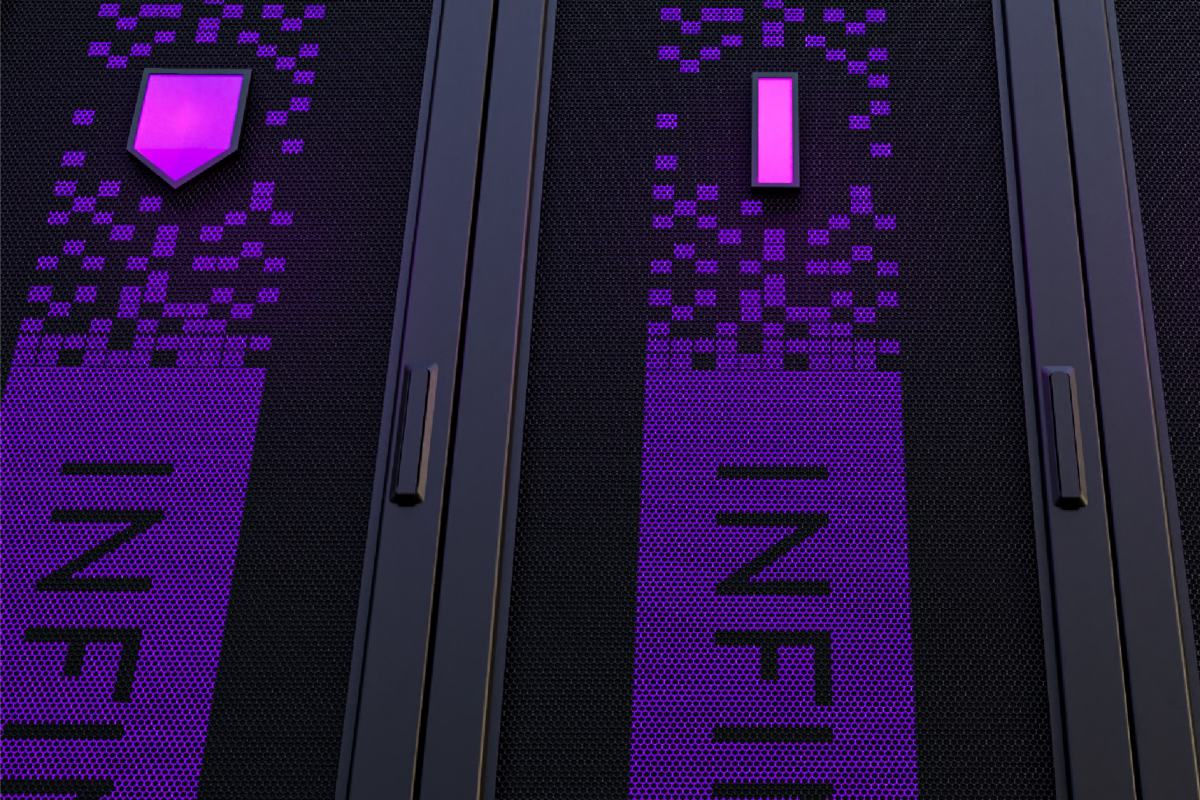News
Data Centre Infrastructure News & Trends
Enterprise Network Infrastructure: Design, Performance & Security
News
Nokia, Keysight complete UET test for AI data centres
Finnish telecommunications company Nokia, in collaboration with Keysight Technologies, a US manufacturer of electronic test and measurement equipment and software, has completed end-to-end testing of ultra ethernet (UET) traffic across its data centre switching platforms, including the 7220 and 7250 Interconnect Routers (IXR).
The test demonstrates Nokia’s integration of Ultra Ethernet Consortium (UEC) Specification 1.0 features into its networking portfolio, designed to support high-performance computing (HPC) and AI workloads.
It marks a step towards lossless, low-latency, large-scale data centre networks built for the demands of AI infrastructure.
Testing UET for next-generation network performance
The UEC Specification 1.0 defines a new ethernet layer optimised for HPC and AI environments, aiming to reduce latency and packet loss while maintaining interoperability across network architectures.
The joint test between Nokia and Keysight used 800 Gigabit ethernet interfaces with UET traffic generated via Keysight’s AresONE 800GE platform.
The network spanned Nokia’s 7220 IXR-H5 and 7250 IXR-10e systems, operating with the SR Linux network operating system.
According to Nokia, the test also validated coexistence with Remote Direct Memory Access over Converged Ethernet (RoCEv2) and Data Centre Quantised Congestion Notification (DCQCN) technologies, both already supported in its switching platforms.
Ram Periakaruppan, Vice President and General Manager of Network Applications and Security at Keysight Technologies, comments, “Networking technologies are evolving rapidly to meet the demands of large-scale AI clusters.
"Ultra ethernet is one of the approaches under active development, enabling the next generation of scale-out fabrics.
"Our collaboration with Nokia represents a key milestone in validating interoperability and accelerating adoption across the AI networking ecosystem.”
Rudy Hoebeke, Vice President of Software Product Management at Nokia, adds, “AI is redefining expectations for data centre network performance.
"This successful demonstration with Keysight of UET traffic over Nokia’s switching platforms underlines our commitment to the UEC initiative and reinforces our role in shaping the future of HPC and AI networking.”
For more from Nokia, click here.
Joe Peck - 6 October 2025
Data Centre Build News & Insights
News
Sustainable Infrastructure: Building Resilient, Low-Carbon Projects
R&M awarded EcoVadis gold medal for sustainability
R&M, a globally active Swiss developer and provider of infrastructure for data and communications networks, has again been awarded a gold medal for sustainability by EcoVadis.
The recognition places the company in the top 4% of all firms assessed globally, and in the top 3% of manufacturers in the “cables and network technologies” sector.
EcoVadis evaluates companies on environmental, social, and ethical performance.
According to R&M, its strongest improvements in the past year were in environmental measures, particularly in the tracking of carbon emissions and waste management.
Integrating sustainability across operations
R&M has said it is embedding sustainability across its business areas through its 'Connecting the Planet' programme, which covers environment, people, ethics, and circular economy.
The company has introduced more detailed measurement of CO₂ emissions, as well as policies to support compliance and integrity in business practices.
The EcoVadis framework assesses organisations against a set of international sustainability standards, including climate protection, labour rights, procurement, business ethics, and transparent reporting of progress.
R&M CEO Dr Roger Baumann says, “EcoVadis confirms that we were able to improve slightly overall and significantly in the environmental area compared to the previous year.
"The entire R&M team is proud that we were once again able to achieve gold status. The award underscores the credibility and effectiveness of our ‘Connecting the Planet’ sustainability programme.”
Jonas Güresir, COO and Sustainability Officer at R&M, adds, “The renewed award is the result of exceptional teamwork.
"We want to continuously develop in all facets of sustainability and contribute to the achievement of the UN Sustainable Development Goals within the scope of our capabilities as a medium-sized, family-owned company.”
For more from R&M, click here.
Joe Peck - 3 October 2025
Data Centre Infrastructure News & Trends
Enterprise Network Infrastructure: Design, Performance & Security
News
Ooredoo, DE-CIX launch Qatar’s first commercial IX
Qatari telecommunications company Ooredoo, in partnership with internet exchange (IX) operator DE-CIX, has launched Doha IX, Qatar’s first commercial IX. The new exchange, hosted in Ooredoo’s data centre, is now live with its first connected networks.
Doha IX is designed to serve as a secure interconnection hub, enabling traffic exchange between regional and global cloud providers, content networks, internet service providers, and hyperscale platforms.
By facilitating direct interconnection, the exchange aims to improve network performance through lower latency while reducing costs for operators.
Connectivity and cloud integration
The platform offers a data-centre-neutral environment, allowing customers to connect to multiple internet service providers (ISPs), content delivery networks, and cloud platforms via a single port. It also provides direct access to DE-CIX’s global interconnection ecosystem.
As part of its service offering, Doha IX enables direct connections to Microsoft Azure Peering Service, giving government and enterprise users in Qatar private access to Microsoft services such as Teams and Outlook.
The exchange is also a Verified Peering Provider for Google Cloud and Workspace, supporting secure connectivity to Google’s enterprise applications.
Through this ecosystem, businesses and service providers can deliver content more efficiently to Qatar’s user base, while international networks gain a direct path to serve the local market.
Thani Ali I A Al-Malki, Chief Business Officer at Ooredoo Qatar, comments, “We are proud to launch Doha IX in collaboration with DE-CIX - a milestone that redefines Qatar’s digital landscape.
"Doha IX delivers world-class interconnection, empowering businesses, ISPs, and content providers with faster, smarter, and more secure access to global content.
"This initiative marks a significant step in driving Qatar’s digital transformation and strengthening its role as a regional connectivity hub.”
Ivo Ivanov, CEO of DE-CIX, adds, “With Doha IX powered by DE-CIX, we are bringing DE-CIX’s global expertise to Qatar, enabling businesses and networks to benefit from superior interconnection services.
"Doha IX is the ideal place for international networks interested in reaching this important Middle Eastern market.
"The new IX will unleash the potential of the country’s digital economy by providing better performance and user experience of content and applications, and affordable and high-quality internet access for enterprises and individuals.”
Doha IX forms part of Qatar’s wider digital development goals under National Vision 2030, aiming to position the country as a regional connectivity hub.
Alongside Ooredoo’s wider service portfolio - including IP Transit, Multi-Cloud Connect, hosting, co-location, and international connectivity - the new exchange is expected to play a role in supporting business innovation and economic growth.
For more from DE-CIX, click here.
Joe Peck - 3 October 2025
Data Centre Infrastructure News & Trends
Enterprise Network Infrastructure: Design, Performance & Security
News
IOEMA subsea cable to land in the Netherlands
The IOEMA Project, which plans to lay subsea fibre optic cables in Northern Europe, has selected Greenhouse Datacenters as an additional landing partner for the landing of the IOEMA subsea cable in Scheveningen (Rotterdam / The Hague area).
This marks the seventh landing point in Northern Europe and the second in the Netherlands for the IOEMA cable. The first Dutch landing will be at Eemshaven, in the country’s northern region.
The project
The IOEMA project is establishing an AI-ready, high-capacity fibre optic connection between the five key Northern European markets.
The Netherlands, Germany, the United Kingdom, Denmark, and Norway will be directly connected via a 1,600-kilometre repeatered subsea cable, with further connectivity to France under consideration.
IOEMA is taking international tensions and security into account by fully armouring and protecting the subsea cable system over its entire length. IOEMA is also considering adding sensors to the system to make it the first SMART cable in Northern Europe.
IOEMA is collaborating on this initiative with partners including Eurofiber, Arelion, Colt, EXA Infrastructure, Relined, Bulk, and EWE TEL.
The latest collaboration with Greenhouse Datacenters is driven in part by its strategic South Holland location, just 12 kilometres from where the subsea cable from the North Sea comes ashore in Scheveningen (Rotterdam / The Hague).
Eckhard Bruckschen, CTO of IOEMA Fibre, says, “We are pleased to announce an additional landing partner for the second Dutch landing point for the IOEMA fibre optic cable in the Netherlands, in the Rotterdam / The Hague area.
"By partnering with Greenhouse Datacenters, IOEMA connects directly into a rich connectivity ecosystem, including an on-site AMS-IX PoP. This makes the IOEMA cable accessible to the broader market in South Holland and beyond.
"Organisations in this area can benefit from ultra-fast, redundant, secure, and AI-ready connections to other internet hubs in Northern Europe via Greenhouse."
A new digital hub
Greenhouse Datacenters CEO Ruben van der Zwan says the selection of Greenhouse as landing partner for the IOEMA subsea cable highlights the strategic importance of its data centres for the Dutch South Holland region and the Netherlands as a whole.
“The Axiom/Terabit report, Study on the development of the submarine cable market, which was recently on the agenda of the Dutch House of Representatives, extensively examined the strategic national importance of new submarine cables for the Netherlands,” comments Ruben.
“The deployment of new submarine cables contributes significantly to stimulating the digital business climate in the Netherlands. Together with data centres and internet exchanges, submarine cables form the basis for further economic development of the Netherlands as an international digital hub."
Rick Pijpers, who is involved in the project as a strategic advisor via PWDR.AI, adds, “The landing station for the subsea cable at Greenhouse is much more than a technical facility; it is a strategic digital hub.
"A data centre that functions as a landing station becomes a gateway to international data traffic, attracting ecosystems of carriers, cloud providers, and enterprises, thereby strengthening the digital economy.
"For Greenhouse and IOEMA, this not only strengthens their own position, but also boosts international connectivity between Norway, Denmark, the United Kingdom, the Netherlands, and Belgium. It creates a new sovereign AI corridor connecting the locations where AI factories will be established in the coming years."
According to Peter van Burgel, CEO of AMS-IX, the landing of the subsea cable in Greenhouse’s data centres in the Rotterdam / The Hague area will strengthen the AMS-IX Point-of-Presence located there.
He argues, “This makes Greenhouse a powerful digital hub and an important alternative to the Amsterdam data centre market. Enhanced by AI applications, the IOEMA subsea cable will bring huge amounts of international network traffic to Greenhouse, while the existing AMS-IX PoP will enable direct exchange with international and regional carrier, cloud, ISP, and content networks.
"This will deliver speed, redundancy, and cost efficiency in digital traffic, reinforcing the South Holland region as a digital hub for AI-driven growth."
For more from IOEMA, click here.
Joe Peck - 3 October 2025
Data Centre DCIM Solutions & Best Practices
Data Centre Infrastructure News & Trends
Events
Evocative to participate at National DICE event
Evocative, a global provider of internet infrastructure, announces that Jay Smith, its Vice President, Data Center Operations and Engineering, is participating on a panel at National DICE Data Center Management, Operations and Cooling - West.
The panel, entitled Data Centre Operations and Management: Navigating the Future of Facility Optimisation and Infrastructure Management, is taking place on Thursday, 2 October 2025 in California, USA.
Jay and other industry executives will explore how data centre tools like data centre infrastructure management (DCIM) are becoming pivotal for modern data centres as they leverage integration with AI, automation, and sustainability features to meet growing operational demands.
The company says Jay will call on his experience leading the operations at Evocative’s US-wide footprint of interconnected, carrier-neutral data centres to inform his perspective.
On the panel, he will draw on this experience to discuss topics such as the best tools available to streamline operations and increase efficiency, managing the increasing complexity of IT infrastructure, and preparing for the rapid growth of AI-ready infrastructure.
The panel and event
What: "Data Centre Operations and Management: Navigating the Future of Facility Optimisation and Infrastructure Management"
Where: Santa Clara Marriott: 2700 Mission College Blvd, Santa Clara, CA 95054
When: Thursday, 2 October 2025 | 8:30 am - 9:10 am PT
Who: Panel members include:
· Jay Smith, Vice President, Data Center Operations and Engineering at Evocative· Stephanie Silva, Cloud Supply Chain and Operations (CSCO) at Google· Clae Anderson, Director, IT Support at Kaiser Permanente
For more from Evocative, click here.
Joe Peck - 2 October 2025
Data Centre Architecture Insights & Best Practices
Data Centre Infrastructure News & Trends
Exclusive
Innovations in Data Center Power and Cooling Solutions
Rethinking fuel control
In this exclusive article for DCNN, Jeff Hamilton, Fuel Oil Team Manager at Preferred Utilities Manufacturing Corporation, explores how distributed control systems can enhance reliability, security, and scalability in critical backup fuel infrastructure:
Distributed architecture for resilient infrastructure
Uninterrupted power is non-negotiable for data centres to provide continuity through every possible scenario, from extreme weather events to grid instability in an ageing infrastructure. Generators, of course, are central to this resilience, but we must also consider the fuel storage infrastructure that powers them. The way the fuel is monitored, delivered, and secured by a control system ultimately determines whether a backup system succeeds or fails when it is needed most.
The risks of centralised control
A traditional fuel control system typically uses a centralised controller such as a programmable logic controller (PLC) to manage all components. The PLC coordinates data from sensors, controls pumps, logs events, and communicates with building automation systems. Often, this controller connects through hardwired, point-to-point circuits that span large distances throughout the facility.
This setup creates a couple of potential vulnerabilities:
1. If the central controller fails, the entire fuel system can be compromised. A wiring fault or software error may take down the full network of equipment it supports.
2. Cybersecurity is also a concern when using a centralised controller, especially if it’s connected to broader network infrastructure. A single breach can expose your entire system.
Whilst these vulnerabilities may be acceptable in some industrial situations, modern data centres demand more robust and secure solutions. Decentralisation in control architecture addresses these concerns.
Distributed logic and redundant communications
Next-generation fuel control systems are adopting architectures with distributed logic, meaning that control is no longer centralised in one location. Instead, each field controller—or “node”—has its own processor and local interface. These nodes operate autonomously, running dedicated programs for their assigned devices (such as tank level sensors or transfer pumps). These nodes then communicate with one another over redundant communication networks.
This peer-to-peer model eliminates the need for a master controller. If one node fails or if communication is interrupted, others continue operating without disruption. This means that pump operations, alarms, and safety protocols all remain active because each node has its own logic and control.
This model increases both uptime and safety; it also simplifies installation. Since each node handles its own logic and display, it needs far less wiring than centralised systems. Adding new equipment involves simply installing a new node and connecting it to the network, rather than overhauling the entire system.
Built-in cybersecurity through architecture
A system’s underlying architecture plays a key role in determining its vulnerability to cybersecurity hacks. Centralised systems can provide a single entry point to an entire system.
Distributed control architectures offer a fundamentally different security profile. Without a single controller, there is no single target. Each node operates independently and the communication network does not require internet-facing protocols. In some applications, distributed systems have even been configured to work in physical isolation, particularly where EMP protection is required.
Attackers seeking to disrupt operations would need to compromise multiple nodes simultaneously, a task substantially more difficult than targeting a central controller. Even if one segment is compromised or disabled, the rest of the system continues to function as designed. This creates a hardened, resilient infrastructure that aligns with zero-trust security principles.
Safety and redundancy by default
Of course, any fuel control system must not just be secure; it must also be safe. Distributed systems offer advantages here as well. Each node can be programmed with local safety interlocks. For example, if a tank level sensor detects overfill, the node managing that tank can shut off the pump without needing permission from a central controller.
Other safety features often include dual-pump rotation to prevent uneven wear, leak detection, and temperature or pressure monitoring with response actions. These processes run locally and independently. Even if communication between nodes is lost, the safety routines continue.
Additionally, touchscreens or displays on individual nodes allow on-site personnel to access diagnostics and system data from any node on the network. This visibility simplifies troubleshooting and provides more oversight of real-time conditions.
Scaling with confidence
Data centres require flexibility to grow and adapt. However, traditional control systems make changes like upgrading infrastructure, increasing power, and installing additional backup systems costly and complex, often requiring complete rewiring or reprogramming.
Distributed control systems make scaling more manageable. Adding a new generator or day tank, for example, involves connecting a new controller node and loading its program. Since each node contains its own logic and communicates over a shared network, the rest of the system continues operating during the upgrade. This minimises downtime and reduces installation costs.
Some systems even allow live diagnostics during commissioning, which can be particularly valuable when downtime is not an option.
A better approach for critical infrastructure
Data centres face incredible pressure to deliver continuous performance, efficiency, and resilience. Backup fuel systems are a vital part of this reliability strategy, but the way these systems are controlled and monitored is changing. Distributed control architectures offer a smarter, safer path forwards.
Preferred Utilities Manufacturing Corporation is committed to supporting data centres to better manage their critical operations. This commitment is reflected in products and solutions like its Preferred Fuel System Controller (FSC), a distributed control architecture that offers all the features described throughout this article, including redundant, masterless/node-based communication, providing secure, safe, and flexible fuel system control. With Preferred’s expertise, a distributed control architecture can be applied to system sizes ranging from 60 to 120 day tanks.
Joe Peck - 2 October 2025
Data Centre Build News & Insights
Data Centre Projects: Infrastructure Builds, Innovations & Updates
News
Echelon announces new €3bn Milan data centre site
Echelon, a developer and operator of large-scale data centre infrastructure, has partnered with controlled affiliates of Starwood Capital Group to acquire a 37-acre site with grid power near Milan.
Echelon says this investment marks the next step of its expansion into Continental Europe and follows the announcement of a €2 billion (£1.74 billion) joint venture (JV) with Spanish energy company Iberdrola to develop data centres in Spain.
Development will begin immediately to create one of Italy’s largest data centre campuses. The site has electrical capacity of 250MVA gross power - 100MVA of which is available immediately through the existing onsite substation.
Up to €3 billion (£2.6 billion) will be invested in the development of the LIN10 data centre campus.
Industry comments
Niall Molloy, CEO of Echelon, says, “Echelon is very pleased to partner with Starwood Capital to enter this new market. LIN10 has in place grid power, scale, and flexibility, which makes it one of the most attractive projects in Europe.
"It is ready to build and offers exceptional opportunities for hyperscale operators. We expect to start construction imminently and have the facility operational in 18 to 24 months. Everyone at Echelon is delighted to have secured our first development site in continental Europe.”
David Smith, Chief Investment Officer at Echelon, comments, “Entering the Italian market is another significant milestone on Echelon’s growth trajectory, and we are delighted to have made this strategic step.
"We have a strong pipeline of exciting opportunities across Europe and expect to add additional markets over the next 24 months to continue to support the growth of our customers.”
Maximilian Gentile, Senior Vice President at Starwood Capital, adds, “We believe in the fundamental growth drivers of the Milan data centre market.
"Demand for data centre capacity continues to grow exponentially globally and this investment demonstrates Echelon’s commitment to delivering power and scale to help customers meet the requirements of an increasingly AI-driven digital economy.”
Echelon currently has seven data centre facilities either operational or in development across Ireland, the United Kingdom, and Spain, with a combined capacity of approximately 1.25GW.
The acquisition of LIN10 forms part of the company’s growth plans to develop an additional 1.5GW of capacity across new locations over the next five years.
For more from Echelon, click here.
Joe Peck - 1 October 2025
Data Centre Infrastructure News & Trends
News
Products
Scalable Network Attached Solutions for Modern Infrastructure
Infinidat expands enterprise storage offerings
Infinidat, a provider of enterprise data storage systems, has announced the expansion of its InfiniBox G4 family of enterprise storage systems with a series of enhancements and a new smaller form-factor model.
The InfiniBox SSA G4 F24 all-flash family aims to deliver high-end storage in a reduced footprint, with improved energy efficiency and a lower entry price point for enterprise storage.
The evolution of the InfiniBox G4 family is hoped by the company to make high-end enterprise storage more accessible to a broader range of enterprises.
Eric Herzog, CMO at Infinidat, says, "We continue to expand and enhance our InfiniBox G4 family, enabling enterprise customers and service providers to store larger quantities of data more efficiently, have easier access to advanced storage capabilities, benefit from flexible capacity management, free up rack space and floorspace, and reduce energy consumption for a greener storage infrastructure at a better power cost-efficiency per terabyte of storage."
Key features of the InfiniBox SSA G4 F24
One of the attributes of the new InfiniBox SSA G4 F24 all-flash family is a 31% smaller physical configuration, intending to achieve a more efficient power profile. The entry price point is also 29% lower than the original small form-factor of the InfiniBox SSA G4.
The system features a 45% reduction in power per petabyte (PBu), which - the company hopes - should mean less power usage, less use of coolant chemicals, and a reduction in greenhouse gas emissions.
Infinidat claims the product offers 28% more capacity in the smaller footprint, up to two times better bandwidth performance, and "over 32% better overall performance."
The full stack of InfiniSafe software's cyber storage security technology comes at no charge with the InfiniBox G4 system.
For more from Infinidat, click here.
Joe Peck - 30 September 2025
Data Centre Infrastructure News & Trends
Enterprise Network Infrastructure: Design, Performance & Security
Exclusive
Future-proofing network infrastructure
In this exclusive article for DCNN, Warren Aw, Chief Commercial Officer at Epsilon Telecommunications, highlights why agile, high-capacity connectivity is the critical ingredient for resilience in an era of relentless digital demand:
Colocation, connectivity, and continuity
In today’s digital landscape, business IT environments are becoming increasingly sophisticated and, with that, more complex. Whether it’s an enterprise working to stay ahead of increasingly digitally savvy consumers, or a service provider keeping those enterprise services and workloads up and running, network downtime is no longer an option.
Downtime is more than just an inconvenience; it’s a major threat to revenue and reputation. For 90% of mid-to-large-sized enterprises, just one hour offline can cost more than $300,000 (ITIC) (£221,000). Despite this, many businesses are still relying on infrastructure that wasn’t built for the scale, speed, or strain of today’s digital demands.
Whether the services are mission-critical or not, a bad online experience can make or break customer relationships in an instant. Customers now expect always-on availability for a wide range of services, such as streaming video content, collaborating in the workplace, performing financial transactions, or accessing cloud services. Business continuity was once a contingency plan, but it has now become a competitive advantage.
That being said, ensuring continuity is also becoming more difficult due to growing data volumes, AI workloads, rising user expectations, and a more distributed business application ecosystem. This, coupled with real-world constraints like power limitations, infrastructure strain, and inconsistent SLAs, is making it more important than ever for businesses to re-evaluate their network and business continuity strategies to stay resilient, particularly if legacy infrastructure is still in play.
Colocation, when combined with agile, high-capacity connectivity, can provide a simpler, smarter way for businesses to keep service access and delivery both online and ahead in a competitive market. Colocation really is more than just racks and servers; it’s an opportunity to future-proof network infrastructure with adaptability, scalability, and reliability at the core.
Legacy infrastructure limitations
As businesses deploy more data-intensive applications, compact edge computing devices, and AI workloads, rising demands are putting increased strain on legacy infrastructure and on-premises environments. This includes:
• Power constraints – Modern applications require newer, high-density equipment, which significantly increases power requirements.• Downtime risks – Legacy infrastructure and single points of failure raise the likelihood of outages, damaging SLAs, revenue, and brand reputation.• Business continuity gaps – Without resilient infrastructure and built-in redundancy, organisations face growing challenges in maintaining always-on availability.• Scalability challenges – On-premises infrastructure can be slow and expensive to scale in response to customer demands or new market opportunities.• High costs – Cooling, power, staffing, and maintenance are stretching budgets and internal team resources.• Inter-provider complexity – Managing connectivity across multiple clouds, partners, and carriers is complex, time-consuming, and prone to performance issues without the right interconnect fabric.
These limitations are pushing IT leaders to look for modern, flexible infrastructure strategies that can grow with their business.
Colocation for business continuity
Colocation is more than just renting space in a data centre; it’s a strategic way to strengthen business continuity while simplifying IT infrastructure. Instead of maintaining costly on-premises facilities, organisations can host critical infrastructure in purpose-built, third-party data centres.
This shift not only reduces capital expenditure, but also enables teams to focus on innovation rather than infrastructure. Colocation provides robust power, security, and carrier-neutral connectivity to a global network ecosystem designed to prioritise uptime, resilience, and reach.
One of the key advantages of colocation is dual-site access, which allows businesses to distribute their infrastructure across two geographically separate, interconnected facilities. This setup is vital for disaster recovery and redundancy planning. If one site experiences a disruption – whether due to a power failure, natural disaster, or hardware issue – traffic and workloads can seamlessly fail over to the second site, minimising downtime and ensuring uninterrupted service delivery.
Colocation also supports business continuity by offering high-speed, low-latency connectivity to clouds, carriers, and partners. On top of this, it offers physical security and environmental controls that exceed most in-house capabilities, as well as power and cooling infrastructure designed for high-density, mission-critical workloads.
Beyond continuity, it brings cost-efficiency, operational simplicity, and access to a broader ecosystem of services. Colocation enables enterprises and service providers to focus on delivering value, rather than managing infrastructure.
Mitigating risk, maximising uptime
With increasingly complex IT environments and 24/7 availability becoming the new norm, having the right infrastructure in place is crucial. Colocation offers a practical, scalable way to support business continuity, reduce risk, and stay flexible in a changing landscape.
Epsilon offers colocation services across key hubs in London, Singapore, New York, and South Korea. Each facility provides 99.999% uptime and robust power backup, as well as direct access to our global network fabric of over 500 data centres, clouds, and internet exchanges via our NaaS platform, Infiny.
By future-proofing network infrastructure, colocation can maximise uptime, improve customer experiences, and build new competitive advantages that can support long-term business goals.
Ultimately, colocation provides the stable foundation that organisations need to safeguard operations in an unpredictable world. Business continuity is no longer a backup plan; it’s a competitive differentiator.
For more from Epsilon, click here.
Joe Peck - 30 September 2025
Data Centre Business News and Industry Trends
Data Centre Training & Certification Programs
News
Kao Data's Academy to promote data centre careers
Kao Data, a developer and operator of data centres, has re-launched its online learning programme, the Kao Academy, aimed at inspiring primary school pupils to explore careers in the data centre and technology sectors.
The initiative, designed for Upper Key Stage 2 (ages 9–11), provides curriculum-based lesson plans explaining what data centres are, their role in modern life, and the types of jobs that will be needed in the future.
The resources also include games, puzzles, and a 'Data Super Hero' competition, targeted at pupils in areas where Kao Data operates, including Harlow, Slough, and Stockport.
Addressing the skills shortage
The relaunch comes as the data centre industry faces a significant talent gap. According to the Uptime Institute, staffing needs are already nearing 2.3 million roles worldwide, with shortages in engineering, operations, and IT infrastructure expected to increase further by 2030.
By linking STEM education to real-world applications through creative resources and classroom activities, Kao Data aims to encourage early interest in technology careers, particularly among underrepresented groups.
The programme has been developed with education specialists and social impact agency Hark London, which will also run in-school activity days in Slough featuring 'Data Centre Superheroes' teaching pupils about digital infrastructure.
Local and industry support
Chris Vince, MP for Harlow, says, “This new educational initiative from Kao Data is hugely welcomed in Harlow to help both teachers and children understand what data centres do and the range of high-quality tech jobs that will be available in the future.
"By helping teachers deliver these vital lessons, we ensure the next generation is ready to thrive in tomorrow’s tech-driven world.”
Navendu Mishra, MP for Stockport, adds, “We must equip the next generation with the skills needed to thrive in an AI-driven economy. Initiatives like the Kao Academy play a vital role in this effort, introducing children to the world of data centres and the critical role technology plays in our lives.”
Lizzy McDowell, Director of Marketing at Kao Data, says, “Our newly re-launched Kao Academy will help children connect STEM subjects to the data centre industry, sparking interest at a formative age and encouraging underrepresented groups to see a place for themselves in the tech industry.
"For the UK to remain competitive in the growing AI and digital economy, it is our collective responsibility to develop initiatives that bridge education and industry early.”
For more from Kao Data, click here.
Joe Peck - 30 September 2025

Head office & Accounts:
Suite 14, 6-8 Revenge Road, Lordswood
Kent ME5 8UD
T: +44 (0)1634 673163
F: +44 (0)1634 673173









